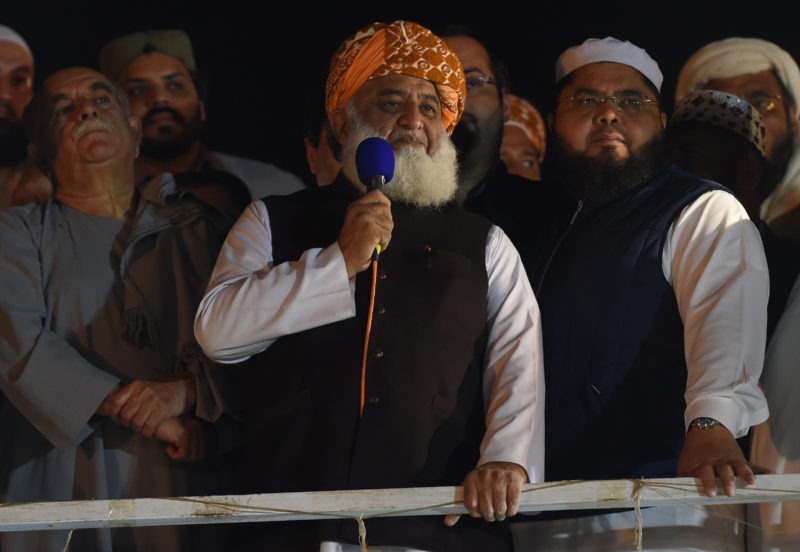Islamist leader calls off protest in Pakistan capital
Maulana Fazlur Rehman, a firebrand cleric who heads one of the country’s largest Islamist parties, said he was launching the “next phase” of his “ongoing movement” (FAROOQ NAEEM)
Islamabad (AFP) – A Pakistani Islamist leader who led thousands of supporters into the capital two weeks ago and demanded Imran Khan’s resignation called off his demonstration Wednesday, but insisted he would move to “Plan B” and continue trying to topple the government.
Maulana Fazlur Rehman, a firebrand cleric who heads one of the country’s largest Islamist parties, said he was launching the “next phase” of his “ongoing movement”, which he said would continue until the government resigns and fresh elections are held.
He addressed supporters, many of whom are madrassa students from around the country, at the campsite in the capital where they have been since October 31, despite the November rain and dropping temperatures.
Now they will move to other roads and highways throughout the country, he said.
One highway — leading from the southwestern city of Quetta to Chaman, one of the main border crossings to Afghanistan which is frequented by NATO supply trucks — was already being blocked by roughly 200 of Rehman’s supporters Wednesday.
Some 150 demonstrators also reportedly blocked a highway in southern Sindh province.
It was not clear how many more roads Rehman planned to block, or how long for. Some supporters at the Islamabad protest said that if the “Plan B” does not work they will return.
“Our Plan B is going to be tougher than Plan A,” promised one, 29-year-old Shehryar Fahim, adding that if needed they would protest at Khan’s private residence in Bani Gala, a suburb of Islamabad.
Rehman has accused the prime minister of taking power last year with the help of the military, which has ruled Pakistan for roughly half its history.
Khan and the military have denied the accusations, which have swirled since the July 2018 election.
But Rehman, a long-time rival of Khan, brought his supporters to Islamabad and gave the prime minister 48 hours to step down.
The deadline came and went with no sign of the prime minister budging.
Initially the leaders of Pakistan’s main opposition parties had offered Rehman their support. However they did not mobilise in large numbers, and their leaders left Islamabad even as Rehman remained.
Other such protests in Islamabad have caused hours-long traffic jams and have even degenerated into violent clashes.
Authorities took Rehman’s demonstration seriously, deploying security forces and blocking roads to the diplomatic area of the capital. The measures did cause traffic jams, but nothing like in the past.
Rehman had chosen his moment carefully, hoping to tap into simmering anger in Pakistan over the deteriorating economy.
However the lack of substance behind his claims led several observers to suggest the demonstration was motivated by his ego amid fears he was losing relevance after his party, long a force in Pakistani politics, was sidelined in the election which brought Khan to power.
Disclaimer: Validity of the above story is for 7 Days from original date of publishing. Source: AFP.


